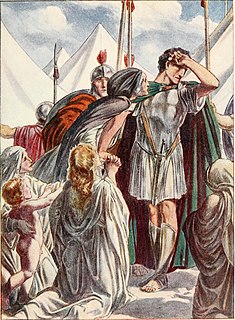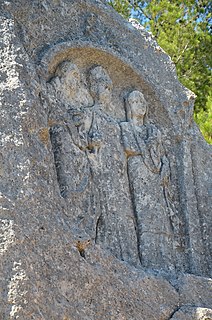This article concerns the period 69 BC – 60 BC.
Quintus Hortensius Hortalus was a famous Roman lawyer, a renowned orator and a statesman. Politically he belonged to the Optimates. He was consul in 69 BC alongside Quintus Caecilius Metellus Creticus. His nickname was Dionysia, after a famous actress. After his retirement Hortensius took up fish-breeding as a hobby. Cicero spoke of him as a Piscinarii – 'fish fancier'.

Atia was the niece of Gaius Julius Caesar, mother of Gaius Octavius, who became the Emperor Augustus, step-grandmother of the Emperor Tiberius, great-grandmother of the Emperor Claudius, great-great grandmother of the Emperor Caligula and Empress Agrippina the Younger, and great-great-great-grandmother of the Emperor Nero.
Lucius Marcius Philippus was a member of a Roman senatorial family. He claimed descent from Roman King Ancus Marcius and was the son of the consul and censor Lucius Marcius Philippus. Appian records that he was propraetor of Syria in 61 BC. He was the father in-law of Cato the Younger and step-father of emperor Augustus.
Marcus Atius Balbus was a 1st-century BC Roman who served as a praetor in 62 BC, he was a cousin of the general Pompey on his mother's side and a brother-in-law of the Dictator Julius Caesar through his marriage to Caesar's sister Julia Minor. Through Julia he became the maternal grandfather of Augustus the first Roman Emperor.

The gens Marcia, occasionally written Martia, was one of the oldest and noblest houses at ancient Rome. They claimed descent from the second and fourth Roman Kings, and the first of the Marcii appearing in the history of the Republic would seem to have been patrician; but all of the families of the Marcii known in the later Republic were plebeian. The first to obtain the consulship was Gaius Marcius Rutilus in 357 BC, only a few years after the passage of the lex Licinia Sextia opened this office to the plebeians.

The Julii Caesares were the most illustrious family of the patrician gens Julia. The family first appears in history during the Second Punic War, when Sextus Julius Caesar was praetor in Sicily. His son, Sextus Julius Caesar, obtained the consulship in 157 BC; but the most famous descendant of this stirps is Gaius Julius Caesar, a general who conquered Gaul and became the undisputed master of Rome following the Civil War. Having been granted dictatorial power by the Roman Senate and instituting a number of political and social reforms, he was assassinated in 44 BC. After overcoming several rivals, Caesar's adopted son and heir, Gaius Julius Caesar Octavianus, was proclaimed Augustus by the senate, inaugurating what became the Julio-Claudian line of Roman emperors.

Julia Minor was the second of two daughters of Gaius Julius Caesar and Aurelia. She was an elder sister of the dictator Julius Caesar, and the maternal grandmother of Rome's first emperor Augustus.

Julia was the wife of the Roman consul Gaius Marius and a paternal aunt of future Roman dictator Julius Caesar.
Quintus Marcius Rex was a consul of the Roman Republic.

Marcia was the second wife of Marcus Porcius Cato Uticensis and the daughter of Lucius Marcius Philippus.
The gens Atia, sometimes written Attia, was a plebeian family at Rome. The first of the gens to achieve prominence was Lucius Atius, a military tribune in 178 BC. Several of the Atii served in the Civil War between Caesar and Pompeius. The gens Attia may be identical with this family, although the individuals known by that name lived nearly a century after the more notable Atii, and are not known to have been related.

Lucius Marcius Philippus was a Roman politician who was elected suffect consul in 38 BC. He was step-brother to the future emperor Augustus.
Quintus Marcius Crispus was a Roman senator and military officer who served under Julius Caesar during the civil wars of the late republic.
Quintus Marcius Rex was a name used by men of the gens Marcia in Ancient Rome. They belonged to the Marcii Reges, a family who were the relatives of Julius Caesar through his grandmother Marcia.

Quintus Marcius Rex was a Roman politician of the Marcii Reges, a patrician family of gens Marcia, who claimed royal descent from the Roman King Ancus Marcius. He was a paternal great-grandfather of Julius Caesar.
The gens Hortensia was an ancient plebeian family in Rome. Members of this gens are first mentioned in the fifth century BC, but from that time somewhat infrequently until the final century of the Republic. The most illustrious of the gens was the orator Quintus Hortensius, a man of great learning, and a contemporary of Cicero. Under the Empire they seem to have sunk back into obscurity.







